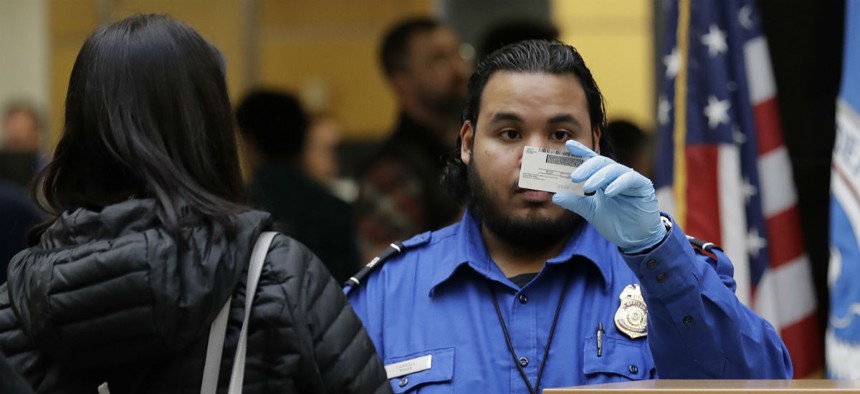Despite Threats, Feds Who Called Out During Shutdown Unlikely to Face Discipline
But those who missed work are still at risk of not receiving back pay.
Federal employees forced to work without immediate pay during the partial government shutdown faced warnings of possible discipline if they called out instead of reporting to duty, but agencies now appear to have backed away from those threats.
Employees at an array of shut down agencies increasingly told their employers they were sick or could not afford to come to work without pay during the record-setting appropriations lapse. Those workers ramped up pressure on lawmakers and the White House to finally reopen government, including Transportation Security Administration employees who caused disruptions to airport security lines and Federal Aviation Administration staff who forced a ground halt at LaGuardia Airport in New York City. Before the shutdown ended, the Office of Personnel Management instructed agencies that any excepted employees taking off without permission should be placed in “absent without leave” status and subject to “appropriate consequences.”
Upon government reopening, however, agencies are taking a different approach. TSA, for example, sent guidance to its workforce this week advising managers to “consider each employee’s individual circumstances over the past 35 days,” communicate with them and consider the agency’s core principles, such as “care for our people.” The agency instructed high-ranking supervisors to hold in-person conversations with any employee before disciplining them and reminded the supervisors they were permitted to simply place employees missing time in furlough, rather than AWOL, status if they faced a “legitimate impediment” in getting to work.
The distinction is an important one, as AWOL status not only makes employees vulnerable to discipline but also missed pay. Under new guidance from OPM, employees who were expected to work during the shutdown but called out will not receive back pay, while those who were furloughed will receive it.
“Many TSA employees faced difficult decisions over the period of the furlough, including about whether they could afford to report to work,” the agency told employees, according to Lisa Farbstein, a spokeswoman. “For those who were not able to come to work because of external situations, we know that this decision was not made easily and may have been required for a number of reasons out of an employee’s control. TSA’s leadership team at each location will assess all factors before making personnel decisions and will do so in a manner consistent with our core values of integrity, respect and commitment.”
The Bureau of Prisons also saw an uptick in call outs as the shutdown dragged into its second month, prompting its director to call the head of the employees’ union to warn him that facility wardens may be forced to take action to compel individuals to report. Acting Bureau of Prisons Director Hugh Hurtwitz cautioned that wardens would “do what they must do to get people to come to work,” according to Eric Young, the union council president. Hurwitz subsequently backtracked from that threat, however, following another OPM memorandum that urged agencies to allow employees to grant leave to excepted workers or place them in furlough status.
A bureau spokesperson declined to comment on the change of course, pointing only to the updated guidance.
At the Internal Revenue Service, thousands of employees who were recalled to work or excepted from the outset of the shutdown did not show up. Many cited a provision as part of the National Treasury Employees Union's collective bargaining agreement with the agency that enables them to call out of work when they face a legitimate hardship. Tony Reardon, NTEU president, said his union's members have generally been "understanding about the hardships that federal employees faced, and continue to face, after going 35 days without pay."
"I appreciate that managers worked with individual employees who were required to work but became ill, had a personal emergency or some other issue that prevented them from coming to work on any specific day," Reardon said.
Greg Martin, a spokesman for the FAA, declined to comment on the specifics of its disciplinary process, saying only that the agency appreciated the employees who did show up to work.
“We sincerely thank FAA employees—especially the dedication and professionalism of our air traffic controllers, technicians, and inspectors—who kept the traveling public and our skies safe during the shutdown,” Martin said.
Some employees will not face discipline because they decided to leave federal service altogether. Employees and union officials at several impacted agencies reported significant increases in retirements and resignations during the shutdown, including at TSA and FAA. OPM said federal employees could have retired during the shutdown by mailing their intentions to their agencies or simply shoving their notice under the door.
This story has been updated with additional comment.




